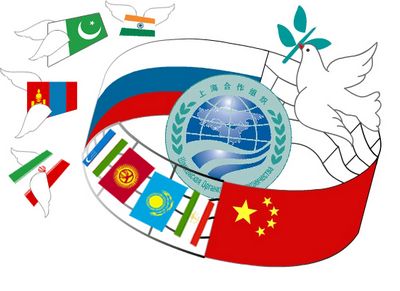New decade for SCO
 |
|
[By Qiguan Hong/China.org.cn] |
On June 15, heads of state from six nations will meet in Astana, capital of Kazakhstan, for a summit marking the 10th anniversary of the Shanghai Cooperation Organization (SCO).
The leaders have much to celebrate. Since its founding in 2001, the SCO has seen significant progress on six fronts:
First, development of "Shanghai Spirit." The soul and spirit of the SCO, Shanghai Spirit consists of mutual trust and benefits, equality, consultation, respect for diverse civilizations and mutual development. This spirit stands in sharp contrast with international relations' prevailing law of might makes right.
Second, expansion of the organization. At present, the SCO has six member states: China, Russia, Kazakhstan, Uzbekistan, Kyrgyzstan and Tajikistan. India, Pakistan, Iran and Mongolia participate as observers, and Sri Lanka and Belarus join in talks as dialogue partners. Afghanistan, Turkmenistan, the Association of Southeast Asian Nations (ASEAN) and the Commonwealth of Independent States (CIS) also frequently participate as guests of the host country. Indeed, the SCO has formed a multi-level structure to meet its development needs.
Third, improving its structure. Besides its annual summit and council of heads of state, the SCO has established regular meetings for heads of parliament and on issues such as foreign affairs, law, economics, disaster relief, culture, education, health and border defense. The SCO has also created several non-governmental institutions such as the SCO Business Council, SCO Interbank Consortium and SCO Forum. The SCO secretariat based in Beijing and Regional Anti-Terrorist Structure (RATS) based in Tashkent are its two permanent executive institutions.
Fourth, strengthening international relationships. The SCO pursues a principle of openness and commits itself to dialogue, exchange and cooperation with other countries and international organizations. Nowadays, it has established formal relations with the United Nations, ASEAN and CIS. It is an observer of the UN Assembly. Furthermore, SCO has established various co-operations with the Organization for Security and Co-operation in Europe (OSCE), United Nations Development Programme (UNDP), Asia-Pacific Economic Cooperation (APEC), Collective Security Treaty Organization of CIS, European Union and World Customs Organization.
Fifth, solidifying security cooperation. Regional security and member states' security-related concerns have been at the core of the SCO since its establishment. Based on the Shanghai Convention on Combating Terrorism, Separatism and Extremism signed in 2001, all member states have initiated joint counterterrorism efforts including sharing intelligence, cooperating to crack down on crime and conducting joint military exercises. These actions have effectively curbed the spread of terrorism, separatism and extremism as well as drug trafficking.
Sixth, increasing economic and cultural exchange. SCO member states have grasped the opportunities and discovered potential in their economic and trade cooperation to strengthen bilateral or multilateral ties. They have launched negotiations on free trade and investment, set up outlines on long-term multilateral trade and achieved successful cooperation on economics, environmental protection, culture, technology, education, energy, communications and finance. All these efforts have made great contributions to sustainable regional development and the improvement of domestic living standards.
 0
0 






